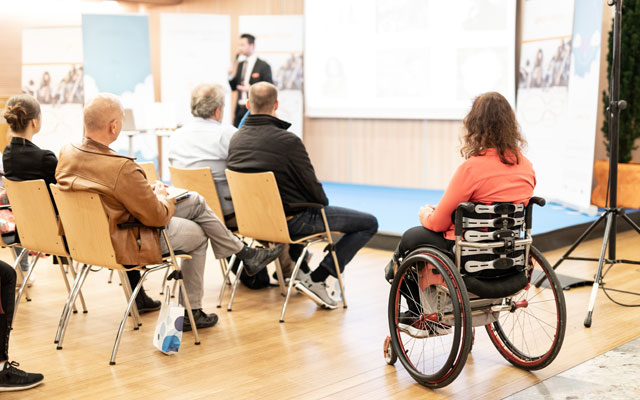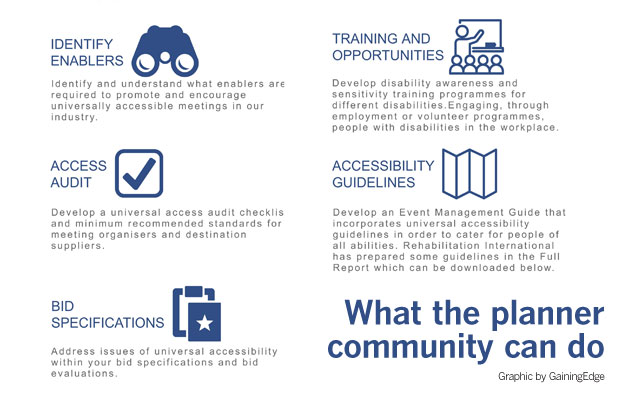As society becomes more inclusive, so must destinations and meeting suppliers if they hope to win global meetings, some of which are attended by delegates with disabilities and special needs
A partnership involving BestCities Global Alliance, GainingEdge and Rehabilitation International has given birth to an 89-page tome, Universal Accessibility in Meetings, which contains recommendations for convention bureaux, tourism and event suppliers and meeting planners to make business events more accessible and inclusive for all people.

The research looks at the needs of disabled and special needs people across a broad range, from physical mobility and senses (vision and hearing impairment), to cognitive/developmental (autism, Down Syndrome, dyslexia) and medical (autoimmune, allergies/diet, cancer, arthritis, etc.).
The authors emphasised the importance of understanding universal accessibility within the business events industry as the prevalence of disability is growing due to population ageing and the global increase in non-communicable conditions including NCDs (non-communicable diseases), road traffic injuries and mental health problems.
Jane Vong Holmes, senior manager Asia with GainingEdge, said: “Around the world there is a call for universal accessibility in tourism, but for the business events industry this is still fairly unexplored territory, resulting in missed opportunities (for destinations and conference planners looking to win global meetings with disabled/special needs attendees).”
Ajit Singh Sikand, president and CEO of HBC Luxury MICE Consulting, noted that physically-challenged persons “have been excluded” from most business events although they “want to be as independent as other delegates – to be able to move around freely (in hotels, convention centres and airports), with signs and infrastructure that allow them to do so”.
He opined that little was being done by hotels, convention centres and destinations, especially for the visually-impaired.

Most of the time destinations are not ready, lamented Rahul Bharadwaj, director technology & operations, of Malaysia-based PCO Anderes Fourdy.
For instance, the PCO handled the Rare Disease Asia Conference in 2016 in Kuala Lumpur, where out of the 500 attendees – comprising companies working on rare disease medical solutions, doctors and the patients – were some 100 wheelchair users.
Rahul shared: “For us, the challenge was to find and get hotels and venues ready for delegates with special needs – such as the setting up of ramps for wheelchair users to get onto stage, have the hotel remove some furniture to allow guests to move around more easily, and modify the seats on vans.”
He added that the company had made bids for a few similar association meetings from Europe, one of them with blind participants but lost it to France because there were no hotels in Malaysia that had braille signs for its facilities and on room doors. Moreover, no hotel or convention centre in Malaysia allowed guide dogs indoors.
Believing that Malaysia was still not ready, Rahul’s company has stopped bidding for such meetings.
He opined that the tourism boards or event venues should resolve universal accessibility issues at business events, as they have the resources to do so.
Ajit suggested that the “community, government and cities” take the lead in starting the conversation on universal accessibility, and that governments enact laws that ensure transport modes are made easily accessible for physically-challenged travellers.
Holmes agrees, saying that destinations with strong universal accessibility often have supportive legislation in place.
“The stronger the legislation, the more numbers of accessible venues. The US, UK, Canada and Australia are some good examples. Although there are some venues that comply (because of the laws), there are others that go beyond their legal obligations, such as the Edinburgh International Conference Centre,” Holmes said.
The Edinburgh International Conference Centre works with the Scottish Association of Sign Language Interpreters to provide interpreters during conferences when required, and partners with The National Autistic Society to train its staff and cater to guests with autism spectrum conditions and sensory disabilities.
For attendees with autism spectrum conditions (ASC), sensory or additional needs, attending an event can be a daunting experience. The venue allocates quiet areas which can be used by delegates during the event, as well as seats outside the rooms if these guests need a break. Public address announcements can be preceded with a soft tune so that sound-sensitive guests are alerted that an announcement is upcoming. Slides are placed on monitor screens for a longer time – about seven to 12 seconds longer than usual – for delegates to read and absorb the information.
In Singapore, multiple stakeholders such as the Building & Construction Authority, Land Transport Authority, Disabled People’s Association Singapore as well as building owners, attractions and places of interests are taking steps to make the island nation more accessible for all. There is even a S$40 million (US$29.3 million) Accessibility Fund available up to FY2021 which will provide for accessibility features for the visually and hearing-impaired. Owners of private buildings, especially those constructed almost 30 years ago, can apply for the fund to upgrade their properties. Seventy per cent of commercial and industrial buildings in Singapore are expected to be barrier-free by 2030.
One recommendation by the Universal Accessibility in Meetings study was that future venues should be designed with universal accessibility in mind, while existing venues can be made more accessible for persons with disabilities (PWDs) by adding facilities such as accessible rest rooms, hotel rooms with doors wide enough for a wheelchair, and a ramp on the podium.
Venus Ilagan, Rehabilitation International’s secretary-general, said: “If people with disabilities have to pay more to attend events or to get a hotel that has the right facilities, then that is not good. It should be one standard for all.”
Ilagan further suggested that destinations look into the concept of universal design and go through the process of creating products from scratch, so that they do not have to make changes later.
She elaborated: “It would only be one per cent additional cost at the start when integrated at the planning stage of building, but if they have to have a post-build audit to analyse where the gaps are, the cost could be 35 to 40 per cent more to retrofit. Universal design should be looked at from the beginning, and not be an afterthought.”











